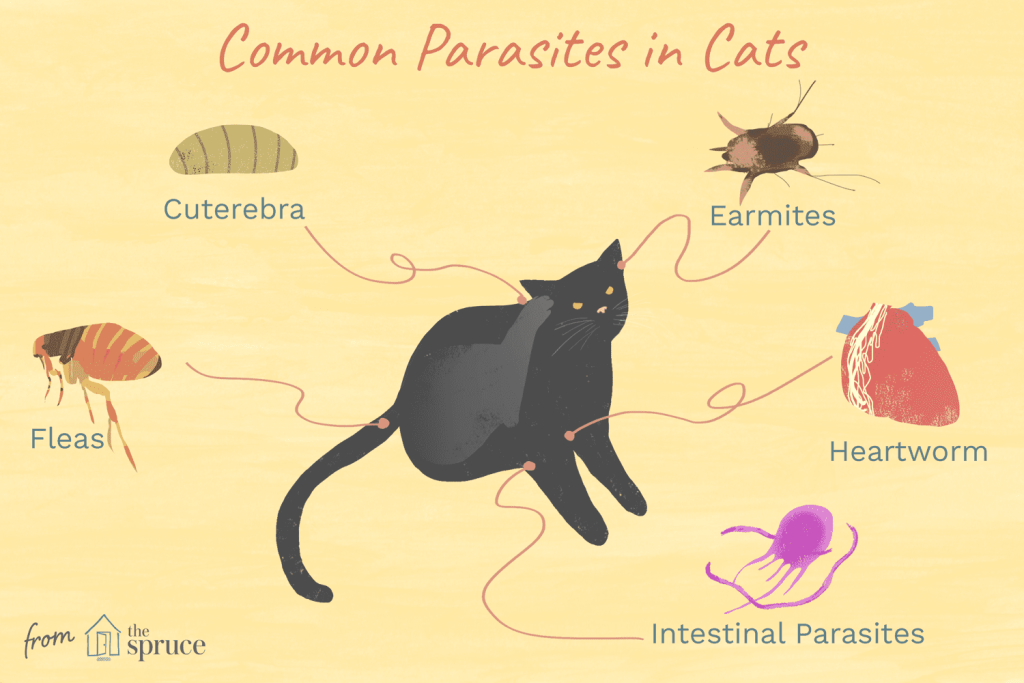Cats are beloved companions, known for their grace, independence, and affection. However, parasites like fleas, ticks, and worms can significantly impact their health and well-being. These parasites are not only uncomfortable for your cat but can also lead to serious health complications if left untreated. Understanding how to recognize, prevent, and treat these common parasites is essential for keeping your feline friend healthy.
Parasites in cats come in various forms, and each has its own way of affecting your pet. Fleas, the most common external parasite in cats, are tiny, wingless insects that feed on blood. They are more than just a nuisance; fleas can cause itching, allergic reactions, and even transmit diseases such as Bartonella, also known as cat scratch disease. Flea infestations can be especially problematic for kittens or senior cats, as they may lead to anemia due to blood loss.

Ticks, another external parasite, are small arachnids that attach to your cat’s skin to feed on blood. Unlike fleas, ticks are less likely to infest your home, but they are equally dangerous. Ticks can transmit diseases like Lyme disease and cytauxzoonosis, a potentially fatal condition caused by a parasite that infects red blood cells. These pests are often found in grassy or wooded areas, making outdoor cats more susceptible to tick bites.
Internal parasites, such as worms, can also pose a significant threat to your cat’s health. Roundworms, hookworms, tapeworms, and lungworms are among the most common types of worms in cats. These parasites often reside in the digestive system, where they steal nutrients from their host. Cats can become infected with worms through various means, including ingesting contaminated food, water, or feces, or by eating infected prey. Worm infestations can lead to symptoms such as diarrhea, vomiting, weight loss, and a bloated abdomen.
Recognizing the signs of a parasitic infection in your cat is the first step in addressing the problem. Fleas are usually easy to spot; you may notice your cat scratching excessively or biting at their skin. Close inspection might reveal tiny black specks, often referred to as “flea dirt,” which are flea droppings. You may also see live fleas moving through your cat’s fur. Ticks are slightly harder to detect but can be felt as small, hard bumps on your cat’s skin, especially around the head, neck, and ears.

Worm infections are less obvious but can manifest in several ways. Cats with worms may exhibit a dull coat, lethargy, or changes in appetite. You might notice worms or segments of tapeworms in your cat’s feces or around their anus. Cats infected with lungworms may display respiratory symptoms such as coughing or difficulty breathing. While some symptoms can overlap with other health issues, any of these signs warrant a visit to the veterinarian.
Preventing parasites in cats is much easier than treating an infestation. Regular use of preventative medications is one of the most effective ways to protect your cat. Flea and tick preventatives come in various forms, including topical treatments, collars, and oral medications. These products not only kill existing parasites but also prevent new infestations. Speak with your veterinarian to determine the best option for your cat, as some products are specifically formulated for certain weights or ages.
Maintaining a clean environment is another crucial aspect of parasite prevention. Vacuuming regularly, washing your cat’s bedding, and treating your home for fleas if necessary can help eliminate these pests. For cats that spend time outdoors, keeping your yard well-maintained by mowing the grass and removing leaf litter can reduce tick populations.
Preventing worm infections involves a combination of good hygiene and preventative care. Ensure your cat does not have access to potentially contaminated food or water, and avoid letting them roam in areas where they may come into contact with infected feces. Routine deworming treatments, especially for kittens and outdoor cats, can help keep worms at bay. Regular veterinary check-ups, including fecal exams, are essential for early detection and treatment of internal parasites.
When it comes to treating parasites, prompt action is vital. For fleas, your veterinarian may recommend a fast-acting treatment to kill adult fleas, followed by a long-term preventative to disrupt the flea life cycle. In severe infestations, you may need to treat your home with sprays or foggers designed to eliminate fleas in carpets, furniture, and other areas. Ticks should be removed carefully using tweezers or a tick removal tool, ensuring the entire tick, including its head, is extracted. If you are unsure how to safely remove a tick, consult your veterinarian for assistance.

Treating worms typically involves the use of deworming medications, which are available in oral or topical forms. These medications target specific types of worms, so it is important to have your cat properly diagnosed by a veterinarian before starting treatment. In cases of severe infestations, your vet may recommend additional supportive care, such as fluid therapy or nutritional support, to help your cat recover.
Living with a parasite-free cat is not only beneficial for your pet but also for your household. Some parasites, such as fleas and certain types of worms, can be transmitted to humans, posing health risks to your family. By taking preventative measures and addressing infestations promptly, you can protect both your cat and your loved ones.
Understanding the risks associated with parasites in cats and staying proactive about prevention and treatment is key to ensuring your pet’s health and happiness. From routine vet visits to maintaining a clean living environment, there are many steps you can take to keep your cat safe from fleas, ticks, and worms. By remaining vigilant and informed, you can provide your feline companion with the care they deserve, allowing them to thrive and enjoy a parasite-free life.
